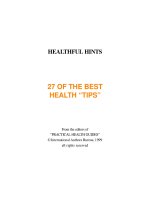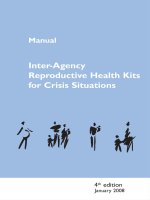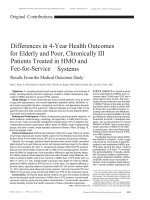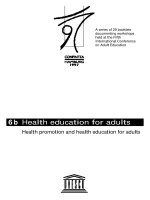Teen Survival Guide Health Tips for On-the-go Girls potx
Bạn đang xem bản rút gọn của tài liệu. Xem và tải ngay bản đầy đủ của tài liệu tại đây (8.44 MB, 80 trang )
Teen
Survival
Guide
Health Tips for On-the-go Girls
Teen
Survival
Guide
U.S. Department of Health and Human Services
Office on Women’s Health
200 Independence Avenue, SW, Room 712E
Washington, DC 20201
U.S. Department of Health and Human Services
Office on Women’s Health
Printed 5/2007
1
Introd
Introduction
H
ave you ever had a question that you were too shy to
ask? Maybe something like:
• “Does chocolate cause pimples?”
• “What do I do if the kids at school make fun of me?”
• “Can I get a sexually transmitted disease from kissing?”
Don’t worry—you’re not the only one! Every young wom-
an has questions like these. Everyone can use some advice.
Having questions is a sign that you are growing up. It
shows that you want to take care of yourself. Don’t be
afraid to go to a parent or guardian, school nurse, or other
trusted adult for honest and straight answers. They were
young once, too!
You can also look to this guide for helpful information. It
offers:
• teen tips
• activities
• fun quizzes
• a glossary of new words
• questions from young women
And, if you want to learn more, you can check out
www.girlshealth.gov or the other web sites listed here.
You can also share what you know by posting your
thoughts on issues facing teens in the “Speak Up” section
of www.girlshealth.gov.
Be informed so that you can make healthy choices!
Teen Survival Guide: Health Tips for On-the-go Girls
1
Table of Contents
Taking care of your reproductive health
Your body 4
Your period 7
Premenstrual syndrome (PMS) 10
Sexually transmitted diseases (STDs) 12
Seeing your doctor 17
For more information 19
Taking care of a beautiful you, inside and out
Hair and skin care 20
Sleep 24
Exercise 26
Eating well 30
Fighting germs 33
Smoking 35
Alcohol and other drugs 37
For more information 39
Feeling good about yourself
Self-esteem 40
Body image 42
When you’re not happy 44
For more information 47
2
www.girlshealth.gov
Taking charge of your world
Stress and how to deal 48
Healthy relationships 50
Peer pressure and how to say no 53
Dealing with bullies 55
Staying safe 57
If your parent uses drugs or alcohol 61
For more information 63
Planning your future
Discovering your interests and talents 64
Thinking about a career 67
For more information 69
Glossary
Bold words are listed 70
Teen Survival Guide: Health Tips for On-the-go Girls
3
www.girlshealth.gov
Taking care of your
reproductive health
Your bodY
The way the female body is
designed is really cool if you
think about it. Check out these
graphics to learn about the major
reproductive organs. These are
the parts of the body involved in
making a baby.
Ovary—Women have two ovaries,
which have eggs (ova) and make
female hormones. One of the
ovaries lets go of an egg about once
each month as part of the menstru-
al cycle. This is called ovulation.
Fallopian tube—When an egg is
released, it travels through the
fallopian tube toward the uterus.
Fertilization—When a man’s sperm
and a woman’s egg join together.
This usually happens in the fallopian
tube.
4
www.girlshealth.gov
Uterus—The uterus is a pear-
shaped, hollow organ where a
baby grows during pregnancy. The
lining of the uterus is called the
endometrium. This lining is shed
during a woman’s period. Eggs
that are not fertilized are shed
along with the lining of the uterus.
Cervix—The cervix is a slim
entrance between the vagina and
the uterus. The muscles of the cer-
vaginal
opening
mons
pubis
labia
clitoris
urinary
opening
anus
Nipple
Areola
(the dark area
around the nipple)
vix are flexible so that it can expand
to let a baby pass through during
birth. (Very cool!)
Hymen—The hymen is a thin piece
of tissue that covers the open-
ing of the vagina. This tissue can
be broken through with the first
sexual intercourse.
Vagina—The vagina is a muscular
passage that leads down from the
cervix to the outside of the body.
Teen Survival Guide: Health Tips for On-the-go Girls
5
Outside of the body, the
entrance to the vagina is
covered by the vulva,
which has five parts:
mons pubis, labia,
clitoris, urinary opening
and vaginal opening.
Every girl’s breasts are different—
in shape, size, and in color. You can
get to know the way your breasts
look and feel by doing a monthly
breast self-exam. (Check out the
web sites listed at the end of this
section to learn how.) This way,
you can ask your doctor about
anything you are unsure about.
Know your Breasts
www.girlshealth.gov
6
www.girlshealth.gov
www.girlshealth.gov
To: girlshealth.gov
From: Cecelia (11), Corpus Christi, Texas
I hear people call parts of a woman’s body names that I
don’t understand. How do I know the right terms to use?
You’re right. There are many slang words people use for
the parts of a woman’s body. You may hear them used by
kids at school and even on TV, in movies, or in some of
your favorite songs. Some of these terms can be really
negative and even make you feel ashamed about your
body. You need to use the right names for sexual organs
for two reasons: to be respectful of a woman’s body and
to be able to talk about any problems with your doctor.
(See pages 4 and 5 for the right terms.)
Fun quiz
The ovaries begin to
make more e_ _ _ _ _ _ _
and other hormones
during puberty.
*Hint: You can find the answers in
one of the web sites listed at the
end of this section.
Answer: estrogen
www.girlshealth.gov
Teen Survival Guide: Health Tips for On-the-go Girls
www.girlshealth.gov
7
Your period
Your period doesn’t have to keep
you from doing the things you
like to do. Nobody even needs to
know you’re having it but you!
Tampons or pads? It’s your
choice
What you should know about
tampons:
] Tampons are put inside of your
vagina to soak up blood before
it leaves your body. Instructions
come with tampons to show
you how to put them in.
] Some tampons have a plastic
or cardboard covering—called
the “applicator”—that makes
it easier for you to put the
tampon in. Do not leave the
applicator inside your vagina.
] All tampons have a string at
the end to help you take it out
when it needs to be changed (at
least every 4 to 8 hours).
] Tampons will not get lost in
your vagina or “slip up.”
] You can wear tampons when
you swim. Water does not
enter your vagina.
] It is VERY important that you
use the tampon with the lowest
level of absorbency (the amount
it can soak up) for your needs.
Don’t use a “super” tampon
if you only need a “regular”
tampon.
8
www.girlshealth.gov
www.girlshealth.gov
] Using tampons that are too ab-
sorbent or not changing them
often enough can put you at
risk for toxic shock syndrome
(TSS), a rare yet dangerous
infection.
Tell an adult and call a doctor if
you are using tampons and have
the following:
• High fever that comes on all
of a sudden
• Muscle pains
• Dizziness or fainting
• A rash that looks like sun-
burn
• Bloodshot eyes
• Strange vaginal discharge
(fluid) with an unusual scent,
look, or feel
• Feeling of confusion
It is possible to tear your hymen
by putting in a tampon, but this is
rare. If it does tear, this does not
mean you are no longer a virgin.
You are a virgin until you have
sexual intercourse.
What you should know about
pads:
] Pads stick to the inside of your
underwear and soak up the
blood that leaves the vagina.
] Some pads are thin, for days
when your period is light. Some
are thick, for when you are
bleeding more. You also can use
thicker pads at night when you
sleep.
Teen tip:
To clean men-
strual blood
from your
underwear or
clothes, soak
the spot for
a few minutes in COLD water
mixed with a little laundry
detergent. Once the blood is
washed out, wash with other
clothes as usual.
www.girlshealth.gov
Teen Survival Guide: Health Tips for On-the-go Girls
www.girlshealth.gov
9
�
�
�
�
�
�
�
�
�
�
�
�
�
�
�
�
�
�
�
�
�
�
�
�
�
�
�
�
�
�
�
�
�
�
�
�
�
�
�
�
�
�
To: girlshealth.gov
From: Nicole (age 12), Greeley, Colorado
Do I need to douche?
Vaginal discharge and having your period might feel
messy to you at first. But rinsing or cleaning out the va-
gina with douche, (cleansing with a special product that
is sold for this purpose), is not a good idea. “Douching”
can make you more likely to get dangerous infections. To
keep feeling fresh, wash your vulva with gentle, scent-
free soap and try using panty liners when you’re not
having your period. Over time, you will get used to these
feelings and may not notice them at all!
] During the day, it is best to
check your pad every couple of
hours so that you can change it
before it is soaked with blood.
] If you are worried about any
smell, changing pads often and
keeping up good hygiene will
help control this. You do not
need to use deodorant pads.
] You probably don’t want to
wear pads when you swim.
They will soak up water and be
bulky.
10
www.girlshealth.gov
www.girlshealth.gov
Teen tip:
To make menstrual cramps bet-
ter, put a warm water bottle or
heating pad on your lower back
or lower belly. You may also
try hugging a pillow. Don’t ever
take medicine without permis-
sion from a parent or guardian.
] Eating less salt the few days
before your period, which can
help stop bloating.
] Drinking less caffeine (found
in soda, tea and coffee) to feel
less crabby and help ease breast
aches and cramps.
] Eating small meals often each
day rather than big ones.
] Exercising for at least 30 min-
utes, four to six times a week.
If you have cramps or aches and
pains, don’t exercise so hard—
you can walk instead of jog.
] Sleeping at least 8 hours each
night.
premenstrual
sYndrome
(pms)
Are you feeling grumpy, tense, tired
or depressed? Maybe you cry a lot
and crave certain foods, too. Or
maybe you have felt changes in your
body, like acne, a bloated stomach,
breast aches or slight weight gain. If
you feel this way and it’s also a few
days before your period, you might
have premenstrual syndrome or
PMS. Don’t worry! PMS is a normal
part of having a period, and you will
feel better soon!
If you get PMS, try…
] Eating more healthful foods and
less sugar and fat.
www.girlshealth.gov
Teen Survival Guide: Health Tips for On-the-go Girls
www.girlshealth.gov
11
Fun quiz
No one knows for
sure what causes PMS,
but it seems to be
linked to the changes in
h _ _ _ _ _ _ levels that
happen during your
menstrual cycle.
*Hint: You can find the answer in
one of the web sites listed at the
end of this section.
Answer: hormone
To: girlshealth.gov
From: Traci (age 14), Anchorage, Alaska
I feel really down before my period. Is this normal?
The blues are a normal part of PMS. If your mood doesn’t
get better within a few days after starting your period, talk
with your doctor or a parent or guardian. Also, check out
the signs of depression on page 45.
] Keeping a regular schedule for
exercise, meals and bedtime.
] Talking to your doctor about
your PMS symptoms. Your doc-
tor may have you take a pain
reliever that has ibuprofen or
naproxen, which you can buy
at a grocery store or drugstore
without a doctor’s orders.
Make sure you have permis-
sion from a parent or guard-
ian first. Your doctor may
give you other medicines if the
symptoms are really bad.
12
www.girlshealth.gov
www.girlshealth.gov
sexuallY
transmitted
diseases (stds)
Sexually transmitted diseases
(STDs) are on the rise among
young people. STDs are caused by
many different viruses and bac-
teria that spread through sexual
contact. Some examples of STDs
are chlamydia, crabs (pubic lice),
genital herpes, gonorrhea, hepati-
tis B, HIV/AIDS, and syphilis. Even
if you’re not sexually active now,
it’s vital to know how to protect
yourself later.
Four key things you need to
know about STDs
1. STDs can affect anyone—wom-
en and men of all ages and racial
and ethnic backgrounds. Teens
and young adults get STDs
more often than any other age
group. About three million
teens get STDs every year. That
means about one in four sexu-
ally active teens gets an STD.
2. You can get an STD by hav-
ing any kind of sex, including
vaginal (penis is put into vagina),
oral (sucking and/or licking of
sex organs), and anal (penis is
put into butt). You can also get
an STD by having other close
sexual contact with someone
who already has an STD.
3. Often, STDs cause no symp-
toms at first. Even if you have
no symptoms, you can still pass
an infection on to another per-
son. If you get symptoms, they
can seem like other problems
that aren’t STDs, such as yeast
infections.
www.girlshealth.gov
Teen Survival Guide: Health Tips for On-the-go Girls
www.girlshealth.gov
13
4. While some STDs can be
treated and will go away, others
can’t be cured. You can only try
to make the symptoms better.
If untreated, some STDs can
lead to pelvic inflammatory
disease, infertility, cancer of
the cervix, or even death. If
you think you have a problem,
see your doctor right away.
Your doctor will check your
skin, throat and genital area.
Your doctor may also test your
blood, urine, or a sample of
tissue or fluid from your body.
If you have an STD, your doctor
can start taking care of you
right away. Even if your STD is
cured with treatment, you can
still get it again if you are sexu-
ally active and do not protect
yourself.
Protect yourself from STDs
] You can’t get an STD if you
do not have sex of any kind or
close sexual contact with some-
one. The best way to protect
your health is to wait until you
are married to have sex.
] Condoms can’t protect you
from all STDs. But, if used
correctly and used all the
time, condoms will lower your
chances of getting some STDs.
Condoms will also lower your
chances of getting pregnant.
] Talk to your parents or guard-
ians, an older brother or sister,
or another trusted adult about
sex to help you make wise
choices.
Abstinence—not having sex—is
the only 100 percent sure way to
not get an STD.
How do I know if I have an
STD?
You should see a doctor right
away if you have lower stomach
pain or have vaginal discharge
(fluid) that is yellow, gray, or green
with a strong smell. In between
periods, it is normal to have a
clear or whitish fluid (discharge)
coming from your vagina.
See your doctor if you have any
of the other symptoms of com-
mon STDs that follow.
14
www.girlshealth.gov
www.girlshealth.gov
STD Symptoms
Chlamydia • Often no symptoms
• Abnormal vaginal discharge
• Burning sensation when urinating (peeing)
Genital
herpes
• Painful small red bumps, blisters, or open sores on
or around your genital area or rectum
• Some infected people may never have sores
• Fever, headache, or other muscle aches
• Swollen glands in the genital area
• Pain in legs, buttocks, or genital area
• Abnormal vaginal discharge
• Pain when urinating (peeing)
Syphilis • Early on: Painless sores in the genital area, on
the lips, or in the mouth and swollen lymph
glands
• Later: Skin rash on the palms and feet, fever,
swollen lymph glands, sore throat, patchy
hair loss, headaches, weight loss, and
tiredness
• Left untreated: Damage to the brain, nerves,
eyes, heart, and blood vessels; can lead to
death
Crabs
(pubic lice)
• Itching in the pubic area
• Often people have no symptoms
• Sometimes rust colored spots on underwear from
bleeding where you have been bitten
• Mild fever and tiredness if you have been bitten by
a large number of lice
www.girlshealth.gov
Teen Survival Guide: Health Tips for On-the-go Girls
www.girlshealth.gov
15
STD Symptoms
Gonorrhea • Most have no symptoms
• Pain or burning sensation when urinating (peeing)
• Yellowish and sometimes bloody vaginal discharge
• Vaginal bleeding between menstrual periods
• Anal discharge, itching, and soreness if the rectum is
infected
Hepatitis B • Yellow skin or yellowing of the whites of the eyes
• Tiredness
• Dark-colored urine
• Lower stomach pain
• Loss of appetite
• Nausea and vomiting
• Diarrhea
• Joint pain
• Some have no symptoms
HIV
(Human
immuno-
deficiency
virus)
• Extreme tiredness
• Rapid weight loss
• Swollen lymph nodes
• Getting low fevers and night sweats often
• Getting oral or vaginal yeast infections and other
STDs often
• Red, brown, or purplish marks on or under the
skin or inside the mouth, nose, or eyelids
HPV
(Human
papilloma-
virus)
• Most people have no symptoms and do not know
they are infected
• Some types of HPV can cause warts—some painful,
some not—in the genital area
16
www.girlshealth.gov
www.girlshealth.gov
What about pregnancy?
Having a baby while you are a teen
can be very hard.
1. Teen mothers are less likely to
finish school and more likely to
be single parents.
2. There are serious health risks
for teen girls who have babies.
3. Teen pregnancy is closely linked
to poverty and single parent-
hood.
Not having sex is the only 100
percent sure way to not get preg-
nant. If you do become pregnant,
talk to a trusted adult such as a
school counselor or parent or
guardian. Also, see a doctor right
away. It is important to get good
prenatal care, which is special
health care for pregnant women. If
you have a friend who is pregnant,
urge her to talk to an adult and
see a doctor right away.
Fun quiz
By the age of 21, almost
___ in 5 people in the
U.S. will need to be
treated for an STD.
*Hint: You can find the answer in
one of the web sites listed at the
end of this section.
Answer: 1
�
�
�
�
�
�
�
�
�
�
�
�
�
�
�
�
�
�
�
�
�
�
�
�
�
�
�
�
�
�
�
�
�
�
�
�
�
�
�
�
�
�
To: girlshealth.gov
From: Allyson (age 14), Portland, Maine
Can I get an STD from kissing?
Kissing is pretty safe. But, you can catch a common virus
that causes cold sores if you kiss someone who has a
cold sore at the time. This virus is called herpes simplex
virus one or HSV-1. STDs are usually spread during
risky acts like vaginal intercourse, oral sex, and skin-to-
skin contact in the genital area.
www.girlshealth.gov
Teen Survival Guide: Health Tips for On-the-go Girls
www.girlshealth.gov
17
seeing Your
doctor
As you become a woman, it’s
important to have checkups once
a year with a doctor or other
health care provider. He or she
will check out your general health
and reproductive health.
Your doctor might ask you
questions about:
] your general health, aller-
gies, medicines you are
taking and your health
concerns
] your mental health, depres-
sion, and stress level
] whether or not you feel safe
] your period, such as how
long it lasts, how old you
were when you first got it,
and when the first day of
your last period was
] when your breasts started
to grow
] whether you have ever had
sex or have been sexually
abused
] your vagina, such as if you have
had any unusual discharge, itch-
ing, or odor
Even if these questions make
you feel a little embarrassed, it
is important to be honest. Your
doctor needs the right informa-
tion about your health and body.
This way, he or she can help you
out if you have a problem. Keep in
mind your doctor has heard these
questions before.
18
www.girlshealth.gov
www.girlshealth.gov
To: girlshealth.gov
From: Jody (age 15), Rockaway, New Jersey
Will my doctor tell my parents about anything I share
during my visit?
Most states have laws that allow teens to see a doctor for
their reproductive health without getting a parent’s okay.
Your doctor will do his or her best to make sure your visit
stays confidential (private), but you can always ask him
or her what the rules are before your exam. If the doctor
thinks that you may harm yourself or others, he or she
may have to tell your parents, guardians, or others about
the visit. Even though it’s important to trust your doctor,
talking to your parent or guardian about your health care
is the smart way to go.
You should see a gynecologist or
another doctor who specializes
in women’s reproductive health
if any of these apply to you:
] you have ever had sex (vaginal,
oral, or anal) or intimate sexual
contact
] you are 21 or older
] you have lower stomach pain,
fever, and vaginal discharge
that is yellow, gray, or green
with a strong smell (these may
be signs of PID)
] you are having problems with
your periods
www.girlshealth.gov
Teen Survival Guide: Health Tips for On-the-go Girls
www.girlshealth.gov
19
More information on taking care of your reproductive health
How to do a breast self-exam:
] www.kidshealth.org/teen/
sexual_health/girls/bse.html
Your reproductive health:
] www.girlshealth.gov/body/
reproductive_health.htm
] www.kidshealth.org/teen/
sexual_health/changing_body/
female_repro.html
Your period:
] www.girlshealth.gov/body/
period.htm
] www.kidshealth.org/teen/
sexual_health/girls/
menstruation.html
Different types of STDs and
protecting yourself:
] www.girlshealth.gov/body/
reproductive_std.htm
] www.iwannaknow.org
General health and
gynecological care:
] www.girlshealth.gov/body/
reproductive_gynecologist.htm
] www.kidshealth.org/teen/
sexual_health/girls/obgyn.html
Learn more about teenage
pregnancy:
] www.teenpregnancy.org
notes
20
www.girlshealth.gov
www.girlshealth.gov
Taking care of a
beautiful you, inside and out
Hair and skin
care
Beauty magazines show tons of
beautiful girls and women in ads
for hair and skin products. But,
don’t be fooled into thinking you
need these products to look your
best. Instead, try these time-test-
ed beauty basics, which will keep
you looking naturally beautiful!
Skin care 101
] Wash your face regularly using a
mild cleanser and warm water.
Be gentle—don’t scrub hard!
Avoid astringents, which can
dry out and irritate skin.
] Use only light, water-based
moisturizers. Look for one that
has SPF 15 or a higher number
sunscreen.
] For sensitive skin, try products
that say “fragrance-free” or
“without perfume.”
This is the same girl!
Don’t compare yourself to mod-
els. They have a team of stylists
as well as camera tricks to make
them look so perfect.
www.girlshealth.gov
Teen Survival Guide: Health Tips for On-the-go Girls
www.girlshealth.gov
21
] If you’re allowed to wear
makeup, use only water-based
products that say “noncomedo-
genic” or “nonacnegenic” on
the label. Make sure to take off
your makeup before going to
bed.
] To control acne, try over-the-
counter products that you can
buy without a doctor’s order.
These products come as gels,
lotions, creams, and soaps.
Your doctor can treat more
serious acne problems.
] Drink plenty of water.
] Always wear “broad-spectrum”
sunscreen, which protects
against UVA and UVB rays.
Wear sunscreen even on cloudy
days. SPF alone does not protect
against these two types of harm-
ful rays. Follow the directions on
the bottle to put more on after
a while. Wear lipscreen with
at least SPF 15. And, your skin
needs more than just sunscreen.
• Wear long-sleeve shirts,
pants, and a hat.
• Stay in the shade.
• Stay out of the sun in the
middle of the day, when rays
are strongest.
Hair care 101
] Wash your hair regularly, but
only as often as you need to.
Washing too often can strip
away the natural oils that give
hair shine and body.
22
www.girlshealth.gov
www.girlshealth.gov
] If you see white flakes in your
hair or on your shoulders, try a
shampoo that treats dandruff.
These shampoos are sold near
other hair-care products.
] Use shampoo, conditioners,
and styling products that are
right for your hair type.
] Try different styles and looks.
But beware of products that
perm, relax, or color hair at
home. They have chemicals that
can damage your hair. Also,
over styling with hairdryers or
curling and flattening irons can
cause your hair to dry out or
break.
] Protect your hair and face from
sun damage by wearing a hat
or scarf that covers the back of
your neck and face.
] Protect your hair from chlorine
(found in pool water) by wear-
ing a swim cap or rinsing out
your hair right after swimming.
Soaking your hair with regular
water before you put on your
swim cap can also help.
Fun quiz
The sun’s UV rays are
strongest between ___
a.m. and ___ p.m.
*Hint: You can find the answer in
one of the web sites listed at the
end of this section.
Answer: 10 a.m. and 4 p.m.
Teen tip:
Wear wrap-around sunglasses
that provide 100 percent UV
ray protection. They look cool
and keep your eyes safe.
www.girlshealth.gov
Teen Survival Guide: Health Tips for On-the-go Girls
www.girlshealth.gov
23
�
�
�
�
�
�
�
�
�
�
�
�
�
�
�
�
�
�
�
�
�
�
�
�
�
�
�
�
�
�
�
�
�
�
�
�
�
�
�
�
�
�
To: girlshealth.gov
From: Lena (age 11), Emporia, Kansas
Does eating chocolate cause pimples?
No way—and neither do dirt, fried foods, or sexual activ-
ity. Changes in your skin during puberty trigger acne.
Stress, your period, picking at or popping your pimples,
scrubbing your skin too hard, getting too much sun and
using oil-based lotions, makeup, or hair gels can cause
breakouts to get worse.
Beauty Do’s and Don’ts
] DO look your age. Heavy make-
up hides your young, natural
beauty—the beauty older
women try so hard to get back!
] DON’T pop zits. This can cause
infections and scars that are
hard to get rid of.
] DO wear sunscreen. Protect
your skin from the sun to help
stop early wrinkles.
] DON’T be hard on yourself.
Instead of thinking about what
you don’t like about your body,
love the things that make you
unique.









